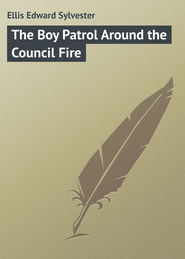По всем вопросам обращайтесь на: info@litportal.ru
(©) 2003-2024.
✖
Among the Esquimaux; or Adventures under the Arctic Circle
Настройки чтения
Размер шрифта
Высота строк
Поля
But Docak did not forget them. At the end of the time named he turned about, and, with something of his old pleasantry, said:
"Much tired – wait while – den go on."
Each of the boys longed to ask him what he thought of the prospect of getting through, but forebore, recalling his moodiness, which might be still upon him despite his present manner.
"I think we're doing quite well, Docak," said Jack; "it's a little hard, but we can take a breathing spell now and then, and keep at it till we strike your home."
Had the Esquimau made any response to this half-inquiring remark the sailor would have followed it up, but he did not. On the contrary, he was busy studying the sky and the surrounding landscape, doubtless with a view of determining what weather changes impended.
The others did the same, but though Jack had learned a good deal of the science at sea he was now at a loss. The dull, leaden sky, so obscured that it was impossible to tell in what part of the heavens the sun was, told him nothing beyond the fact that more snow was likely to fall before many hours.
As the best thing that could be done, the friends studied the actions of the Esquimau.
The result of his survey was not satisfactory – that was clear. He shook his head and muttered something in his own language, which had anything but a pleasant effect on the others.
The scene was one of utter loneliness and desolation. North, east, south, and west stretched the snowy plain, unrelieved by tree, house, or sign of a living creature. Far up in the sky sounded the honk of some wild fowl, and, looking aloft, a line of black specks could be seen, sailing swiftly southward through space, as if to escape the Arctic cold that would soon smother everything in its icy embrace.
The rest was barely ten minutes, when Docak, looking at his companions, asked:
"Be rested? We go on?"
"Yes; we're ready," replied Jack.
"All right – work hard now – don't get tired."
"I won't, if I can help it; but the only way I know of is to stand still, which don't pay in this kind of business."
The Esquimau bent to his work, as if striving for a wager. He had a way not only of stepping down in the soft snow, but of shoving it partly aside from his path. It would have been the severest kind of labor for anyone else, and it is hard to understand how he managed it so well. It was a great help to the one immediately behind him. Jack would have been glad to lighten the task for the boys, but that was out of his power, and he wasted no strength in the attempt.
The party was becoming accustomed to the work. That the guide was aware of this was proven when he kept at it fully twice as long as before. They were going slowly – very slowly – but there was comfort in the consciousness that every step taken was toward safety, and the task before them was lessened, even to that small extent.
At the moment the boys were beginning to think it about time another halt was called, Docak stopped in his former abrupt way, and, leaning to one side, peered into each face in turn.
Something in Fred's appearance caught his attention, and, with an exclamation, he sprang out of the path, and hurried back to where the lad stood, wondering what was the matter with the fellow.
CHAPTER XXIX
TEN MILES
Docak, when flurried, generally forgot his broken English, and spoke in his own tongue. Before Fred could divine his intention he had slipped off one of his mittens, grasped a handful of snow, and throwing one arm about the boy's neck, began rubbing his nose as though he meant to rub it out of existence.
The watchful native was on the watch for the first sign of freezing in the case of his companions, and, discovering that the youngest member was becoming a victim without himself or friends suspecting it, he resorted to heroic measures, with no unnecessary delay.
Fred understood what it all meant, and, like the sensible boy he was, submitted with good grace, though the vigorous handling to which that organ was subjected made it hard for him to keep from protesting. Not only that, but, when the Esquimau, pausing to inspect his work, said:
"All right," Fred thanked him.
Jack and Rob, who looked grinningly on, while the performance lasted, now asked Docak whether they were in need of a similar manipulation. He took another look at the faces, and gave Rob's a slight rubbing, but said nothing more was needed.
It was a piece of thoughtfulness on the part of the native, for which he deserved to receive gratitude. But for him Fred Warburton, and probably the others, would have suffered injuries from which they never could have recovered.
Having rested but a brief while, Docak moved on, and the dismal procession wound its way slowly through the snow, which clogged their feet and obstructed their path to that extent that more than once the hardy guide had to come to a full halt that he might decide in what way to flank the obstacle.
The blizzard had played fantastic tricks with the snow. In many places it was drifted to a depth of six or eight feet, through which, as may be supposed, it was the severest labor to force a path. In others, again, it had swept the crust entirely clear of the new layer, so that they walked as easily as when making their way from the coast. Unfortunately, these bare places, as they may be called, were not only few and far apart, but of such slight extent that their aid counted for little.
There is nothing more cheering than the certainty that we are approaching our goal, even though the rate of progress is more tardy than we wish. As the afternoon drew to a close Fred was positive they had made fully twenty miles. Rob believed it was more, but, to be on the safe side, fell in with his friend's figures. When Jack was appealed to he declined to hazard a guess, saying he preferred to wait till the halt for the night, when he would leave it to Docak.
"He'll tell you within a quarter of a mile," added the sailor, "and he won't make a mistake. I can let you know one thing, howsumever, my hearties, and that is that you'll find it a good deal less than you think."
"I don't know about that," said Rob; "Fred and I have calculated the matter pretty closely."
"You may think so, but you haven't. We have worked hard enough to tramp a hundred miles, but we haven't been able to use it in the best way."
Another fact, which might mean a good deal or little, was that a marked moderation in the temperature took place in the course of the afternoon. What this portended was left to the Esquimau to determine. Toiling through the snow was not favorable to conversation, and it was dropped.
With only short halts the party pushed onward, until night began settling over the dreary landscape. They would have kept on had not the darkness been impenetrable. The sun had not shown itself during the day, and the obscurity was so dense that not a solitary star twinkled overhead.
"Besides," as the boys concluded, "the rest of the distance is so brief that we can afford to leave it until morning, by which time we will be fully rested. Inasmuch as it is necessary to pass a night on the road, one spot is as good as another."
Camping at such times is simple. They were in the middle of a snowy waste, without tree or rock to shelter. Starting a fire, of course, was out of the question. A slight wind was blowing, and though less rigorous than that of the preceding night, it was necessary to protect themselves from its force while they were idle.
For a few minutes Docak acted like a man seized with convulsions or the St. Vitus' dance. He leaped about, kicked, and swung his arms, the snow flying in a storm from him, until, at the end of a few minutes, he had scooped out a bowl-like space, large enough to hold the party. In doing this he cleared the way down to the lower crust only, which was strong enough to bear their weight. To have dug to the ground would have been too laborious, and no special advantage was to be gained by doing so.
This completed, he carefully spread his bear-skin on the hard surface, and the four seated themselves back to back. They had camped for the night.
The discomforts of this primitive method were less than would be supposed. There is warmth in snow, as you are well aware, cold being a negative existence, and, so long as they were below the surface, they could not be reached by the wind that swept across the dismal waste. Then, too, the change in the temperature was in the right direction as affecting their comfort, so there was little fear of suffering before morning.
When they were adjusted for the night, Rob asked the question of Docak which had been in his mind for hours:
"How far have we got toward home?"
Fred was confident the answer would be twenty miles; while Rob was quite hopeful it would be more. Judge, therefore, their consternation when the reply struck their ears:
"Purty near ten mile – not quite – purty near."
The hopes of the boys sank to zero. Jack, knowing they had placed their estimate too high, still believed it greater than was the fact.
Ten miles! Barely a third of the distance between the cavern and the first place that could offer refuge.
They had used a day in advancing thus far. At that rate two more days, and possibly nights, remained ere the terrible task would be ended. They had eaten the last mouthful before starting, leaving behind some food which they might have brought, but which was not deemed necessary.
It was not the prospect of hunger that appalled them. In such a severe climate they could go a couple of days without food, and not suffer greatly, though the draught upon their strength would be trying to the last degree.
The great question was whether the task they had essayed was a possible one. Recalling the terrific exertions of the day, their exhaustion, and the repeated rests that were necessary, they might well doubt their ability, though it need not be said there was no thought of giving up so long as life and strength held out.
"Ten miles," repeated Fred Warburton; "are the Esquimau miles the same as our English, or aren't they double their length?"
"I don't know about that," said Rob; "they must get their ideas from the Danes, who have a system of measurement different from ours, but it don't matter in this instance."











